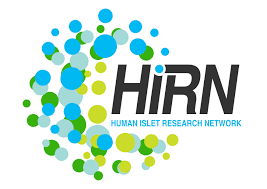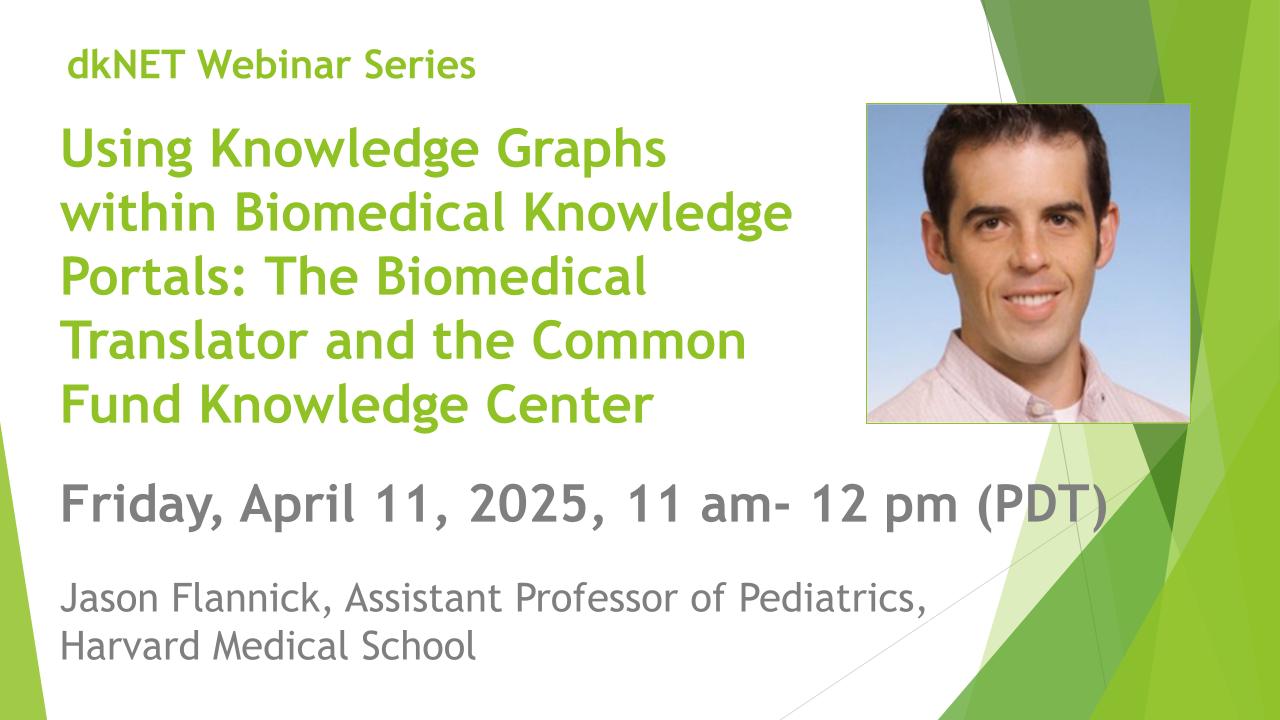Leaving Community
Are you sure you want to leave this community? Leaving the community will revoke any permissions you have been granted in this community.
dkNET New Investigator Pilot Program in Bioinformatics (Now Closed)
Subscribe to our newsletter to receive future funding opportunities
Key Dates
Posted Date: November 30, 2021
Letter of Intent Due Date: January 28, 2022 [LOI should be submitted before 9 pm PST (12 am EST)]
Application Due Date: February 28, 2022 [application should be submitted before 9 pm PST (12 am EST)]
Scientific Review: March-April 2022
Earliest Start Date: July 2022
Expiration Date: March 1, 2022
Submission Site
For further information and submission instructions please go to the submission portal.
Introduction
As high throughput technologies become routine for individual laboratories in biomedical research, there is a growing need to develop a workforce that can use and further refine the computational approaches needed to interrogate complex data. This pilot program, through the NIDDK Information Network (dkNET), is designed to encourage new investigators to develop and apply innovative bioinformatics approaches to important research problems in Diabetes, Endocrinology and Metabolic Diseases (DEMD). The dkNET New Investigator Pilot Program is designed to: (i) facilitate the ability of Early Stage and New Investigators with computational and bioinformatics expertise to pursue research questions in DEMD, or (ii) allow Early Stage and New PIs currently pursuing DEMD-related research to explore incorporating computational, mathematical, statistical, and/or bioinformatics approaches into their research projects.
Background
Contemporary biomedical research is increasingly dependent on high dimensional and high throughput technologies that generate vast amounts of complex data. Experimental approaches such as Genome Wide Association Studies (GWAS), whole genome sequencing, epigenomic mapping, transcriptomics, proteomics, metabolomics profiling, as well as an array of single cell high dimensional measures are increasingly being applied in NIDDK-relevant research. Modern, individualized clinical care approaches are also being developed that integrate Artificial-Intelligence (AI)-assisted pathological diagnosis, deep phenotyping and genetic data, EHR, as well as real time multi-modal sensors and monitoring/delivery devises. Extensive data and computational resources are also required to support modern image analysis and structural studies of proteins and chemical entities involved in biological processes. Accordingly, many NIDDK-supported research projects have already generated large datasets that are relevant to DEMD mission areas. Many of these datasets require complex analysis using sophisticated bioinformatics to reveal important characteristics related to disease incidence, onset, severity, and therapeutic responses. The ultimate goal of this pilot program is to increase the number of investigators that have the skill sets needed to apply modern computational approaches to important questions in DEMD research.
Objectives and Scope
Bioinformatics is an interdisciplinary field that applies quantitative sciences concepts and computational methods to advance our understanding of biological data and principles. Acquiring bioinformatics expertise will be important for many new DEMD investigators who need to manage large datasets and to leverage associated databases and analytical pipelines to solve contemporary biomedical problems. On the other hand, investigators with existing bioinformatics expertise will need to develop an in-depth knowledge of the biological systems and disease processes that underlie the data to design relevant and practical approaches. In the future, having cross-disciplinary expertise in both laboratory and quantitative biology will be important for formulating relevant questions, for developing, choosing, and assembling the proper analytical techniques, and for interpreting and presenting the outcomes in a meaningful and impactful way. The goal of the dkNET Pilot Award program is to provide support for Early Stage and New Investigators seeking to apply computationally-intensive methods to important questions in diabetes, endocrinology and metabolic diseases research. These awards will provide funding for preliminary studies that can serve as a foundation for the development of future grant applications in DEMD-focused topic areas.
dkNET Pilot Award applications should focus on applying computational and/or modeling approaches, whether data-driven, mechanism-driven, or integrated, to compelling research problems in diabetes, endocrinology and related metabolic disorders. Consistent with these goals, this program will support projects focused on a wide array of topics including, but not limited to:
- Metabolic modeling of known and unknown pathway kinetics and compartmentalization in diabetes and/or endocrine or metabolic disorders;
- Network and systems biology of intra and intercellular regulation and inter-tissue and organ homeostasis focused on etiology, diagnosis, prognosis or responses to treatment, including computational approaches to identify biomarkers capable of tracking disease process or progress;
- Structural biology/informatics and chemical informatics of endocrine and metabolic pathways in diabetes, endocrinology and related metabolic diseases;
- AI-assisted image analysis and spatial omics of organs or tissues of relevance to diabetes or metabolic disease;
- Computational characterization of the normal or abnormal development of involved organs such as the formation of pancreatic islets;
- Innovative approaches to characterize and understand type 2 diabetes heterogeneity;
- Clinical informatics including curation, modeling and integration of data from EHR, medical devices, wearables and smartphone apps in diabetes prevention, care and management;
- Data science approaches to understand, reduce, and prevent diabetes-related health disparities, including new analysis through social networks and structure;
- The mechanisms for dysregulated glycemia, or diabetes in increased susceptibility or altered course of COVID-19 infection, and for metabolic dysfunction, diabetes, or other endocrine diseases that result from COVID-19 infection.
Of particular interest are projects that can leverage and expand the utility of existing large datasets developed in NIDDK projects and programs. For examples, see the dkNET webpage at NIDDK-specific-repositories. Research designed to address important research questions through the development of new analytical tools, or through novel secondary analyses of existing datasets are encouraged.
Award Information
Funding Instrument: Subcontract, awarded from the NIDDK Information Network (dkNET), University of California San Diego
Application Types Allowed: New. Studies meeting the current NIH definition of Clinical Trials will NOT be eligible for support under this funding opportunity.
Funds Available: dkNET intends to commit approximately $700,000 in FY2022 to fund up to 3 awards
Award Budget: Awards are limited to $150,000 direct costs over the lifetime of the award (up to 2 years), plus applicable F&A costs to be determined at the time of award.
Project Period: The maximum project period is 2 years.
Contact Information
Xujing Wang, Ph.D.
DDEM/NIDDK/NIH
Tel: 301-451-2862
xujing.wang@nih.gov *Preferred method of contact
Pilot Program Award Recipients
Watch Awardees's Webinar Series Recordings
Funding Cycle 2020-2022

Qian Li, Ph.D.
Assistant Professor, Biostatistics Department, St. Jude Children's Research Hospital (Current Position); Assistant Professor, Health Informatics Institute, University of South Florida (YR1 Position)
Project Title: Integrative analysis methods for temporal multi-omic data in the TEDDY study
Publications Highlights from the Program
- Qian Li*, Kendra Vehik, Cai Li, Eric Triplett, Luiz Roesch, Yi-Juan Hu, Jeffery P. Krischer. A robust and transformation-free joint model with matching and regularization for metagenomic trajectory and disease onset. BMC Genomics Sep 19;23(1):661, 2022.
doi: 10.1186/s12864-022-08890-1 - Khandakar Tanvir Ahmed, Sze Cheng, Qian Li, Jeongsik Yong, Wei Zhang. Incomplete time-series gene expression in integrative study for islet autoimmunity prediction. Briefings in Bioinformatics Jan 19;24(1):bbac537, 2023. doi: 10.1093/bib/bbac537
- Hao Feng, Guanqun Meng, Tong Lin, Hemang Parikh, Yue Pan, Ziyi Li, Jeffery Krischer, Qian Li*. ISLET: Individual-specific reference profile and cell-type-specific reference panel recovery improves cell-type-specific inference. (Under revision, Genome Biology, Method paper)
Software/Tools Created
- Individual-Specific ceLl typE referencing Tool (ISLET, RRID:SCR_022978) :
https://bioconductor.org/packages/devel/bioc/html/ISLET.html; https://github.com/qianli10000/ISLET - mtradeR(Metagenomic TRajectory Analysis with Disease Endpoint and Risk factors, RRID:SCR_022977) : Joint model with Matching and Regularization (JMR) implementation in an R package mtradeR: https://github.com/qianli10000/mtradeR

Marcus Seldin, Ph.D.
Assistant Professor, Biological Chemistry, University of California Irvine
Project Title: Informatics approaches to dissect interorgan communication
Publications Highlights from the Program
- QSeldin M, Yang X, Lusis AJ. Systems genetics applications in metabolism research. Nat Metab. 2019. Nov;1(11):1038-1050. doi: 10.1038/s42255-019-0132-x. Epub 2019 Oct 21. Review. PubMed PMID: 32259026; PubMed Central PMCID: PMC7111511.
- Greco CM, Koronowski KB, Smith JG, Shi J, Kunderfranco P, Carriero R, Chen S, Samad M, Welz PS, Zinna VM, Mortimer T, Chun SK, Shimaji K, Sato T, Petrus P, Kumar A, Vaca-Dempere M, Deryagin O, Van C, Kuhn JMM, Lutter D, Seldin MM, Masri S, Li W, Baldi P, Dyar KA, Muñoz-Cánoves P, Benitah SA, Sassone- Corsi P. Integration of feeding behavior by the liver circadian clock reveals network dependency of metabolic rhythms. Sci Adv. 2021 Sep 24;7(39):eabi7828. doi: 10.1126/sciadv.abi7828. Epub 2021 Sep 22.PMID:34550736
- Koplev, S., Seldin, M., Sukhavasi, K. et al. A mechanistic framework for cardiometabolic and coronary artery diseases. Nat Cardiovasc Res 1, 85–100 (2022). https://doi.org/10.1038/s44161-021-00009-1
- Nelson ME, Madsen S, Cooke KC, Fritzen AM, Thorius IH, Masson SWC, Carroll L, Weiss FC, Seldin MM, Potter M, Hocking SL, Fazakerley DJ, Brandon AE, Thillainadesan S, Senior AM, Cooney GJ, Stöckli J, James DE. Systems-level analysis of insulin action in mouse strains provides insight into tissue- and pathway-specific interactions that drive insulin resistance. Cell Metab. 2022 Feb 1;34(2):227-239.e6. doi:10.1016/j.cmet.2021.12.013. Epub 2022 Jan 11.PMID: 35021042
- Velez LM, Van C, Moore TM, Zhou Z, Johnson C, Hevener AL, Seldin MM. Genetic variation of putative myokine signaling is dominated by biologic sex and sex hormones. Elife. 2022 Apr 13;11:e76887. doi:10.7554/eLife.76887. Online ahead of print.PMID: 35416774
- Molendijk J, Seldin MM, Parker BL. CoffeeProt: an online tool for correlation and functional enrichment of systems genetics data. Nucleic Acids Res. 2021 Jul 2;49(W1):W104-W113. doi:10.1093/nar/gkab352.PMID: 33978718
- Oh S, Bournique E, Bowen D, Jalili P, Sanchez A, Ward I, Dananberg A, Manjunath L, Tran GP, Semler BL, Maciejowski J, Seldin M, Buisson R. Genotoxic stress and viral infection induce transient expression of APOBEC3A and pro-inflammatory genes through two distinct pathways. Nat Commun. 2021 Aug 13;12(1):4917. doi: 10.1038/s41467-021-25203-4.PMID: 34389714
- Norheim F, Chella Krishnan K, Bjellaas T, Vergnes L, Pan C, Parks BW, Meng Y, Lang J, Ward JA, Reue K, Mehrabian M, Gundersen TE, Péterfy M, Dalen KT, Drevon CA, Hui ST, Lusis AJ, Seldin MM. Genetic regulation of liver lipids in a mouse model of insulin resistance and hepatic steatosis. Mol Syst Biol. 2021. Jan;17(1):e9684. doi: 10.15252/msb.20209684. PubMed PMID: 33417276; PubMed Central PMCID:PMC7792507.
Software/Tools Created
- CoffeeProt (RRID:SCR_022256) https://coffeeprot.com/
- Human Myokine Signaling Study https://github.com/marcus-seldin/myokine-signaling
- Endocrine Communication Nonrestored Clocks https://github.com/marcus-seldin/endocrine_communication-nonrestored-clocks

Wei Zhang, Ph.D.
Assistant Professor, Department of Computer Science & Genomics and Bioinformatics Cluster, University of Central Florida
Project Title: A novel multi-omics data integration system for phenotype prediction of diabetes
Publications Highlights from the Program
- Khandakar Tanvir Ahmed, Sudipto Baul, Yanjie Fu, and Wei Zhang*. Attention-Based Multi-modal Missing Value Imputation for Time Series Data with High Missing Rate. SIAM International Conference on Data Mining (SDM), April 2023
- Khandakar Tanvir Ahmed, Sze Cheng, Qian Li, Jeongsik Yong, Wei Zhang*. "Incomplete time-series gene expression in integrative study for islet autoimmunity prediction." Briefings in Bioinformatics Jan 19;24(1):bbac537, 2023. doi: 10.1093/bib/bbac537.
- Fahmi NA, Ahmed KT, Chang JW, Nassereddeen H, Fan D, Yong J, Zhang W. APA-Scan: detection and visualization of 3'-UTR alternative polyadenylation with RNA-seq and 3'-end-seq data. BMC Bioinformatics. 2022 Sep 28;23(Suppl 3):396. doi: 10.1186/s12859-022-04939-w. PMID: 36171568; PMCID: PMC9520800.
- Khandakar Tanvir Ahmed, Jiao Sun, Sze Cheng, Jeongsik Yong, and Wei Zhang* “Multi-omics Data Integration by Generative Adversarial Network.” Bioinformatics (2021) DOI: 10.1093/bioinformatics/btab608
- Khandakar Tanvir Ahmed, Jiao Sun, William Chen, Irene Martinez, Sze Cheng, Wencai Zhang, Jeongsik Yong, and Wei Zhang*. “In Silico Model for miRNA-mediated Regulatory Network in Cancer.” Briefings in Bioinformatics (2021) DOI:10.1093/bib/bbab264
Software/Tools Created
- OmicsGAN (RRID:SCR_022976) : https://github.com/compbiolabucf/omicsGAN
- PTNet (RRID:SCR_022975) : https://github.com/compbiolabucf/PTNet
- APA-Scan (RRID:SCR_022974) : https://github.com/compbiolabucf/APA-Scan
- Teddy study IA prediction (RRID:SCR_023303): https://github.com/compbiolabucf/TEDDY
- TSEst (RRID:SCR_023304): https://github.com/compbiolabucf/TSEst
Funding Cycle 2021-2023

Rafael Arrojo e Drigo, Ph.D.
Assistant Professor, Department of Molecular Physiology and Biophysics, Vanderbilt University
Project Title: Dissecting the heterogeneity of human islet cells with single cell technologies
Publications Highlights from the Program
- Shrestha S, Erikson G, Lyon J, Spigelman AF, Bautista A, Manning Fox JE, Dos Santos C, Shokhirev M, Cartailler JP, Hetzer MW, MacDonald PE, Arrojo E Drigo R. Aging compromises human islet beta cell function and identity by decreasing transcription factor activity and inducing ER stress. Sci Adv. 2022 Oct 7;8(40):eabo3932. doi: 10.1126/sciadv.abo3932. Epub 2022 Oct 5. PMID: 36197983.

Alok V. Joglekar, Ph.D.
Assistant Professor, Center for Systems Immunology and Department of Immunology, University of Pittsburgh School of Medicine
Project Title: Systems analyses of T cell repertoires in Type 1 Diabetes

Alan Rupp, Ph.D. (Funded 2021-2022)
Computational Biologist at GSK (Current Position); Research Investigator, Division of Metabolism, Endocrinology, and Diabetes, University of Michigan (YR1 position).
Project Title: Uncovering the mechanism of leptin resistance

Jack Virostko, Ph.D.
Assistant Professor of Diagnostic Medicine, Dell Medical School, University of Texas at Austin; Appointments in Oncology, Oden Institute for Computational Engineering and Sciences, LIVESTRONG Cancer Institutes
Project Title: Machine learning of abdominal MRI and CT in the A2ALL liver transplant study
Publications Highlights from the Program
- Roger R, Hilmes MA, Williams JM, Moore DJ, Powers AC, Craddock RC, Virostko J. Deep learning-based pancreas volume assessment in individuals with type 1 diabetes. BMC Med Imaging. 2022 Jan 5;22(1):5. doi: 10.1186/s12880-021-00729-7. PMID: 34986790; PMCID: PMC8734282.

Kenneth Young, Ph.D.
Assistant Professor, Health Informatics Institute, University of South Florida
Project Title: Integrative artificial intelligence approach to predict T1D
Funding Cycle 2022-2024

Joon Ha, Ph.D.
Associate Professor, Department of Mathematics, Howard University, Washington DC
Project Title: Estimating Relative Beta-Cell Function During Continuous Glucose Monitoring

Jing Liu, Ph.D.
Assistant Professor, Department of Physics, Indiana University-Purdue University Indianapolis, Member of Center for Computational Biology and Bioinformatics, and Center for Diabetes and Metabolic Diseases; Associate member of Simon Comprehensive Cancer Center, Indiana University School of Medicine
Project title: Developing Single Molecule Spatial Transcriptomics towards Single Cell Phenotyping in Type 1 Diabetes

Nabil Rabhi, Ph.D.
Instructor, Department of Biochemistry, Boston University School of Medicine
Project Title: Integrating Regulatory Maternal Obesity Programs Controlling Adipose Tissue Cellular Complexity

Rie Sakai-Bizmark, Ph.D.
Assistant Professor, The Lundquist Institute at Harbor-UCLA Medical Center, David Geffen School of Medicine at UCLA
Project Title: Postpartum Glucose Screening among Homeless Women with Gestational Diabetes

Wenting Wu, Ph.D.
Research Assistant Professor, Center for Diabetes and Metabolic Diseases, Department of Medical and Molecular Genetics, Indiana University School of Medicine
Project Title: Heterogeneity of Single Cells Obtained from Peripheral Blood Mononuclear Cells Collected from Youth with Recent Onset Type 1 Diabetes




